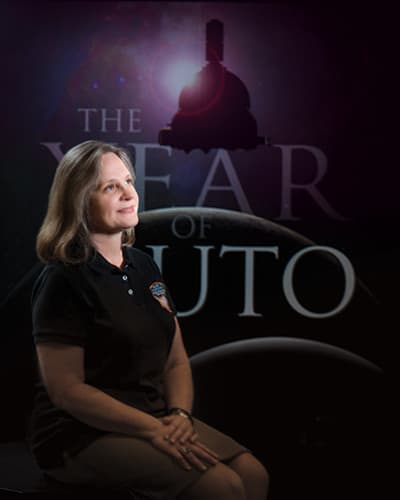AS THE MISSION OPERATIONS MANAGER, ALICE BOWMAN HELPED GUIDE NEW HORIZONS
INTERVIEW BY Martha Thomas PORTRAIT BY Mary C. Gardella
NOVEMBER/DECEMBER 2015
Alice Bowman, 54, is the first female MOM at the Johns Hopkins Applied Physics lab in 
Q What is the background for a job with the New Horizons team?
We have a mix, which is great for mission operations. We have aerospace engineers, we have electrical engineers. My background is in physics and chemistry. We have a political science major and a math major. What we share is a love of exploration and space operations. We get a whole bunch of different viewpoints and opinions, meaning a great product at the end.
Q Have you always been interested in outer space?
I have. Growing up, we had the Mercury, the Gemini, the Apollo expeditions. Every nine months or so, it seems, we were watching another rocket take off. That’s what inspired me. I can still have that wonderment I had as a child. It’s like living a dream.
Q What does a MOM do?
We’re involved in the building and designing of the spacecraft from an operations point of view. After launch, you can’t change anything on the spacecraft except for the software. So if a component breaks, or you encounter something unexpected, it’s like a puzzle. We started in 2001 with the proposal. The design was solidified maybe two years after, meaning we were ready to build. Then a lot of testing goes on while you are building
Q So maybe it is a bit like what a mom does. You create something. You try to anticipate all its needs and then you launch it and hope for the best.
There’s a lot of testing and engineering that goes into it. Space is unknown and it’s unforgiving. In our profession, you have to always keep that in mind.
Q This project has been going on for quite a while – nearly 15 years. How did you deal with the rapid change in technology over that time?
One way we tried to mitigate that was to write up a longevity plan, so we could operate our spacecraft. When we started this mission, we used videotapes to film our training sessions. It was a mission of such long duration, new people would join the team; people would leave, or come back after an absence. They could watch the video.
Q But nobody uses VCRs any more!
So we decided that when anything appears on eBay that we can use, we’re going to buy it. For example, we have different operating systems. We started on a Sun system. We were able to upgrade many of our computers to the next generation – but there are some pieces of software that only run on certain machines. We also saved a lot on paper. You know how we went from floppy disks, to those little hard disks, to memory sticks? We knew that paper would always be around.
Q I think it’s so cool that you don’t have a master’s degree. It seems as if so many jobs these days require one.
I’m often introduced as doctor. I’ll correct them and say, ‘Thank you but I don’t have a doctorate.’ I’ve never felt any limitations. When I was in school, I enjoyed it, but I was very anxious to get out and get my hands dirty. I was excited about joining the work force and doing something.
Q Do you think Pluto needs to be upgraded back to planet status?
To me it doesn’t matter. It’s a place unexplored that we wanted to explore. It doesn’t make any difference if it’s a planet or a dwarf planet.
Q When it was downgraded, people seemed really passionate about it.
I like to say everyone loves the underdog. When we were approaching the planet, I thought it was fitting that we saw the image of the heart.
Q That must’ve blown your mind.
I was amazed. Some things are beyond our comprehension. I think the brain tries to fit things in pictures, recognize shapes. I think that’s just being human. We all saw the heart. It’s not like you have to stretch your imagination. You anthropomorphize.
Engineering is definitely a hardcore science, but the pictures we’re returning from Pluto are beautiful. They look like someone painted them. The universe is just a wondrous place – that’s the artistic side of it – yet science and engineering have made it possible. It does my heart good.
Q How will the data from the mission rock our worlds?
Hasn’t it already? The Kuiper Belt objects (in the region beyond the planets) are some of the oldest in the solar system. What scientists are hoping to understand is the origins of earth – and how the solar system formed.
Q I understand you play an instrument.
I play electric bass in a bluegrass band.
Q When you’re up there playing, do people know you’re a rocket scientist?
Not unless they know me.
Q How did you feel about the movie “Gravity,” with Sandra Bullock?
I thought it was fun. If you were looking at it to show the principles of physics, you’d be frustrated. But those scenes where she is above the earth and floating and you felt that vertigo – that part is probably realistic. You hear of astronauts who train themselves to not totally freak out.
Q If you had the chance would you go up?
When I was a kid, that’s what I wanted to do, I didn’t even care if I wasn’t going to come back. After graduating from college, that kind of subsided. I had some friends who went through the astronaut selection process. It sounded pretty brutal.
Q But you did kind of fulfill that childhood dream. You’ve become a space explorer from the ground.
Yes, it’s pretty amazing. You work so hard for something because you love it and then all of a sudden you realize what just happened. I think I’m still reeling a little bit. I belong to a space operations committee composed of members from most of the space faring nations. My German friends are saying, “Oh I saw you on German TV.” The mission has captured the attention and imagination of so many on such a grand scale. It’s that pure joy of exploration. *




